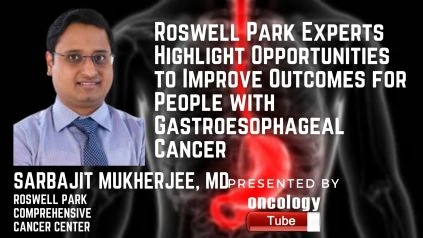Sarbajit Mukherjee, MD, MS, Assistant Professor of Oncology in the Department of Medicine at Roswell Park Comprehensive Cancer Center speaks about Roswell Park Experts Highlight Opportunities to Improve Outcomes for People with Gastroesophageal Cancer
Link to Article:
https://www.roswellpark.org/newsroom/202107-roswell-park-experts-highlight-opportunities-improve-outcomes-people
During the European Society for Medical Oncology (ESMO) World Congress on Gastrointestinal Cancer 2021, two specialists from Roswell Park Comprehensive Cancer Center were asked to discuss new findings on the treatment of gastroesophageal malignancies. The Roswell Park physician-researchers emphasized easily adoptable approaches that may assist other physicians to deliver treatment that supports improved patient outcomes in their presentations, both of which were presented on July 1.
Sarbajit Mukherjee, MD, MS, Assistant Professor of Oncology at the Department of Medicine, presented findings from a research that found a link between inflammation, cell proliferation, and prognosis in gastroesophageal cancer patients treated with immunotherapy (Abstract SO-5).
Obese people react better to immune checkpoint inhibitor (ICI) treatment than nonobese patients, according to a previous study by Dr. Mukherjee and colleagues. They predicted that obesity causes inflammation, which can be treated with ICI, and that obesity is linked to a greater response to ICI therapy.
To test this theory, the researchers looked at the gene expression profiles of tumors from individuals with metastatic gastroesophageal cancer. Overweight individuals accounted for 61 percent of the study’s participants, with a BMI of 25 or above.
Researchers looked at the prognostic and predictive significance of preoperative chemotherapy sensitivity in gastric adenocarcinoma in another study led by Dr. Mukherjee’s mentee, Lei Deng, MD, Hematology/Oncology Fellow at Roswell Park (Abstract SO-7).
The researchers found 2,952 individuals with stomach adenocarcinoma diagnosed between 2006 and 2017 using the National Cancer Database. The findings indicated that sensitivity to preoperative chemotherapy is not only linked to survival in these patients, but that sensitivity can also predict postoperative chemotherapy benefit.
The researchers took a unique technique, determining treatment sensitivity based on changes in the stage before and after preoperative chemotherapy and surgery. Sensitivity was classified as highly sensitive (no residual disease at the time of surgery after treatment), sensitive (the lower stage after treatment), or refractory (no residual disease at the time of surgery after treatment) (no stage change or more advanced disease after treatment).
Patients with sensitive illnesses were shown to benefit significantly from postoperative chemotherapy in this research. Overall survival in sensitive individuals increased after postoperative chemotherapy, with a 5-year survival rate of 73.9 percent compared to 65 percent in those who did not get it. Very sensitive or refractory patients showed no improvement with postoperative chemotherapy.
These data show that preoperative chemotherapy sensitivity is prognostic and can predict postoperative chemotherapy benefit in this patient population, although further research is needed.

